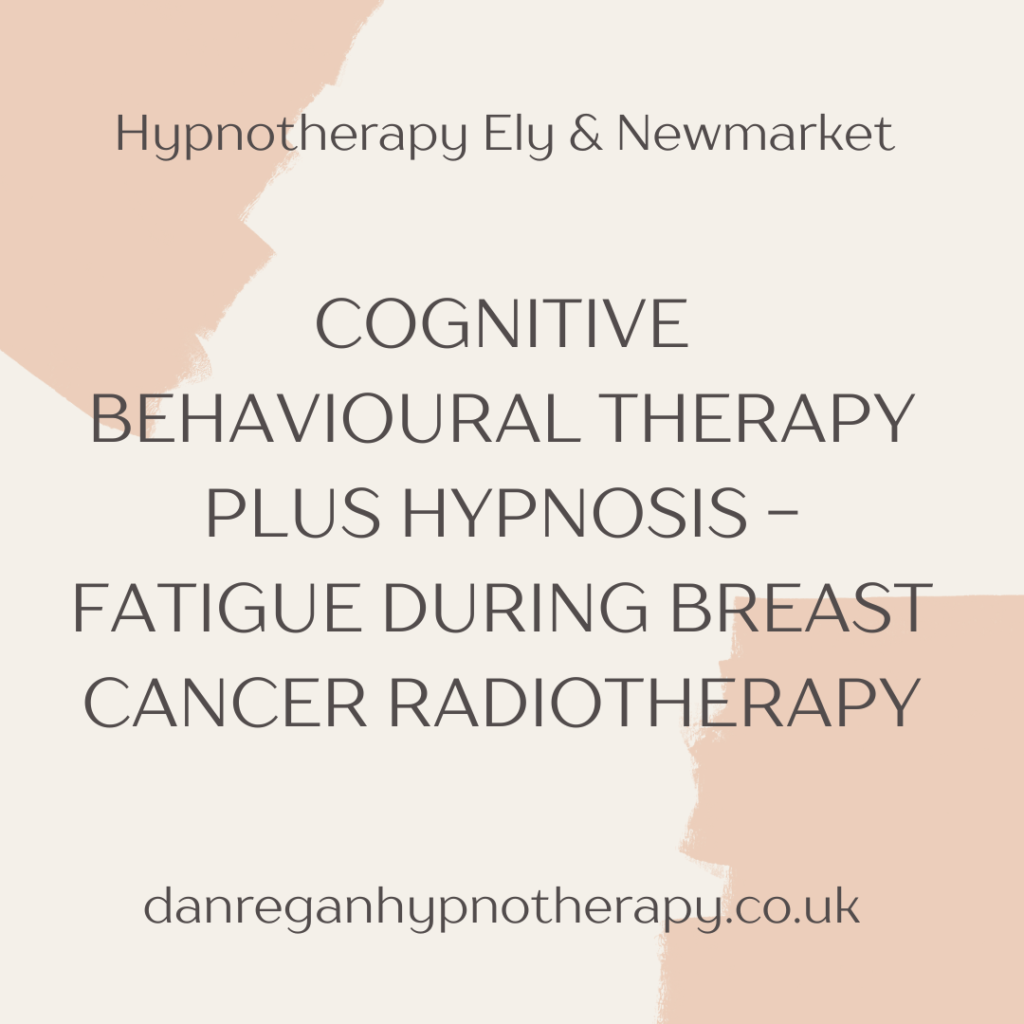Required
Cognitive Behavioural Therapy Plus Hypnosis – Fatigue During Breast Cancer Radiotherapy

Cognitive Behavioural Therapy Plus Hypnosis – Fatigue During Breast Cancer Radiotherapy
In my last blog I wrote about the research that demonstrates that adding hypnosis to cognitive behavioural therapy has a fairly substantial effect. That is, hypnosis enhances the effects of cognitive behavioural therapy across a broad range of problems.
One area where the effectiveness of a combined approach of cognitive behavioural therapy and hypnosis has been studied is with regard to treating radiotherapy related fatigue. This particular study involved women scheduled for breast cancer radiotherapy.
As the researchers noted, fatigue is frequently rated as the most distressing symptom faced by breast cancer radiotherapy patients. Fatigue typically increases over the course of the treatment and has detrimental effects to patients’ physical, psychological, social and occupational functioning. In addition, there are other relevant factors such as catastrophising about fatigue and emotional distress.
As an aside, even before this particular study, an earlier one had demonstrated support for the use of hypnosis with breast cancer surgery patients.
Or as that earlier clinical trial put it,
“The present randomized controlled trial demonstrated that a brief hypnosis intervention before breast cancer surgery statistically significantly reduced intraoperative use of the analgesic lidocaine and the sedative propofol. The hypnosis intervention also reduced patient-reported postsurgical pain (intensity and unpleasantness), nausea, fatigue, discomfort, and emotional upset to an extent that was consistent with benchmarks for clinically meaningful differences...” (Montgomery, 2007).
In the study I’m mainly referring to here, the participants were randomly assigned to receive standard medical care or a cognitive behavioural therapy with hypnosis intervention.
Those who received cognitive behavioural therapy with hypnosis received a hypnosis sessions that covered common misconceptions about hypnosis, suggestions for mental and physical relaxation, guided imagery of a safe and peaceful place and specific suggestions for reduced radiotherapy-related fatigue, reduced distress, increased sense of relaxation, increased well-being and increased energy.
In addition, they were taught skills including how to recognise negative beliefs (catastrophising), the consequences of such beliefs and how to debate such beliefs and change them to something more beneficial.
The control group who received standard medical care naturally received none of this cognitive behavioural therapy with hypnosis.
So what did the researchers find?
“The present randomised clinical trial demonstrated that an intervention combining cognitive behavioral therapy and hypnosis (CBTH) was effective for controlling fatigue in breast cancer radiotherapy patients. Both weekly and daily data supported this conclusion. It appears that the intervention prevented increased in fatigue during radiotherapy.”
Pretty impressive findings there. Those in the control group reported their fatigue increased linearly, whereas those in the CBTH group reported that their fatigue did not increase over the course of treatment.
“In conclusion, this initial test of CBTH to control fatigue during radiotherapy for breast cancer suggests that this intervention is effective for controlling, and perhaps even preventing, the development of fatigue in patients undergoing radiation treatment for breast cancer.”
To your health and happiness,
Dan Regan
Cognitive Behavioural Therapy plus Hypnosis in Ely & Newmarket
If you would like to chat about how hypnotherapy could help you then you can book your Complimentary Hypnotherapy Strategy Session with Dan now: Appointments
And be sure to learn what other people have said after their hypnotherapy sessions with Dan: What People Say
You can also check out these powerful hypnosis downloads that can start helping you right away: Hypnosis Downloads
References:
Fatigue during breast cancer radiotherapy: An initial randomized study of cognitive–behavioral therapy plus hypnosis. By Montgomery, Guy H.,Kangas, Maria,David, Daniel,Hallquist, Michael N.,Green, Sheryl,Bovbjerg, Dana H.,Schnur, Julie B. Health Psychology, Vol 28(3), May 2009, 317-322
Guy H. Montgomery, Dana H. Bovbjerg, Julie B. Schnur, Daniel David, Alisan Goldfarb, Christina R. Weltz, Clyde Schechter, Joshua Graff-Zivin, Kristin Tatrow, Donald D. Price, Jeffrey H. Silverstein; A Randomized Clinical Trial of a Brief Hypnosis Intervention to Control Side Effects in Breast Surgery Patients, JNCI: Journal of the National Cancer Institute, Volume 99, Issue 17, 5 September 2007, Pages 1304–1312, https://doi.org/10.1093/jnci/djm106
Get Your Copy Right Now…
Subscribe to Dan’s Digest filled with tips, strategies and techniques and get instant access to your free rapid relaxation hypnosis audio track.
Enjoy feeling and being more mentally calm and physically relaxed right now:




0 Comments